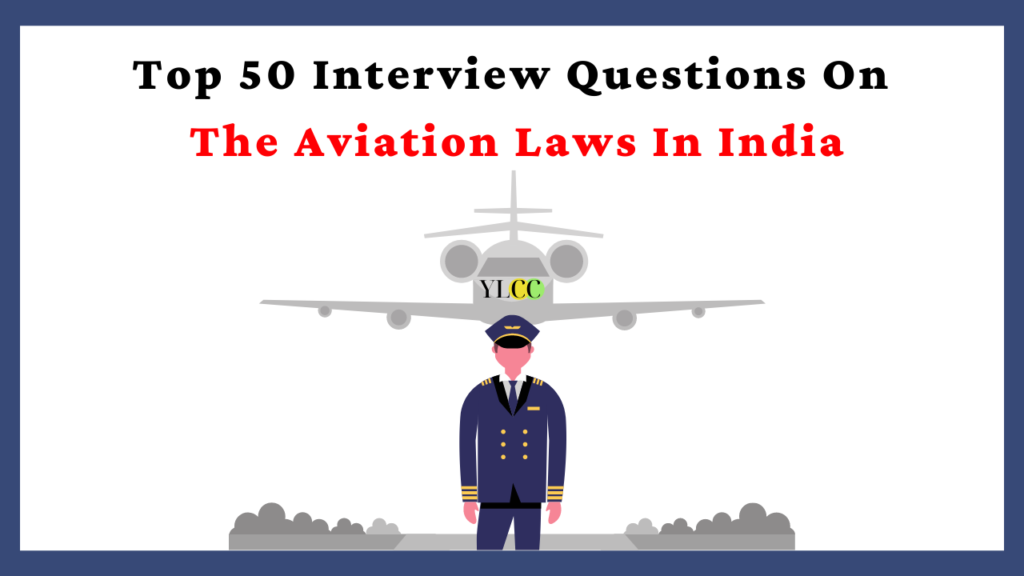
INTRODUCTION
Aviation law is the law that governs flight and all of the legal issues that arise as a result of it. In simple words, Aviation law is the law of Air. The Indian civil aviation industry is regulated by the Aircraft Act of 1934 and the Aircraft Rules of 1937. It focuses on improving regulations related to aircraft. It is pertinent to note that only the aviation industry is exempted from WTO regulations. In layman’s terms, air law is “a set of rules that govern the use of airspace and the benefits it provides to aviation, the general public, and governments around the world.”[1] The central regulatory body for civil aviation in India is the Directorate General of Civil Aviation which is also known as DGCA.
In this article, Team YLCC brings you the Top 50 Interview Questions On the Aviation Laws in India. Read on!
- What do you understand by Aviation Law?
- Is Air law and Aviation law the same?
- What constitutes unruly behaviour under this Act?
- What are the objectives of the Aircraft Act?
- What do you understand by “aerodrome”?
- Does the central government have the power to exempt certain aircraft?
- Who has the power to make rules under this Act?
- Can the central government authorize to detain an aircraft?
- Under what conditions for work done in good faith?
- When rules are made under this Act is it necessary to present them before the parliament?
- What is the maximum age limit for professional pilots?
- Is there any bar on the use of portable electronic devices?
- What do you understand by “Safety Management Systems”?
- What is the difference between category A and category B aircraft?
- What are the conditions of flying a Private Aircraft?
- What is the penalty discussed in this Act for abetment offences?
- Does the Court have requisite power of forfeiture?
- What is the penalty for flying an aircraft to cause danger?
- What is the significance of the Tokyo convention?
- What are the objectives of the Montreal Protocol?
- Who is responsible for the administration and governance of the aviation industry?
- Is Aircraft Act 1934 and 1937 the same?
- What is the significance International Civil Aviation Organization (ICAO)?
- What are the emergency powers for protecting public health?
- What is the minimum age for sole control of aircraft?
- What do you understand by “Aerial work aircraft”?
- What are the documents required to carry in Aircraft?
- Is there any requirement to carry radio-telegraph apparatus?
- Are there any rules related to Assault and other acts of interference against a crew member?
- What does the term prisoner in this Act mean?
- What is a Flight Navigator?
- Is the carriage of animals, birds and reptiles in aircraft allowed?
- What does this Act say on smoking in aircraft?
- Is there any Disqualification from holding or obtaining a licence?
- Can the pilot fly for more than 125 hours during any period of 30 consecutive days?
- Is a foreign license valid under this Act?
- What is the minimum educational qualification for holding a licence?
- What is a Flight Manual?
- To whom defects and defective parts of Indian aircraft must be reported?
- Can the Central government make rules to investigate accidents?
- Who is considered as “Father of Indian civil aviation”?
- What is the harmonic construction rule?
- Is the aviation industry subjected to the rules of WTO?
- When did the liberalisation of the aviation sector begin?
- What do you understand by “Flight time in a glider”?
- What is the role of the Director-General under the aircraft Act?
- Under which schedule the Director-General may appoint Examiners for carrying out flying tests?
- What does ‘maintenance’ under the rule of maintenance standards and certification mean?
- In how many categories Aircraft Maintenance Engineer’s licences can be issued?
[1]Paridhi Dave, Aviation law : all you need to know about laws governing unruly passengers on flights, I PLEADERS (Aug. 21, 2020), https://blog.ipleaders.in/aviation-law-all-you-need-to-know-about-laws-governing-unruly-passengers-on-flights/#What_is_aviation_law.
YLCC would like to thank Anam Khan for her valuable insights in this article.
Read Our Article On ‘Top 50 Interview Questions On The Insolvency And Bankruptcy Code’ HERE.







